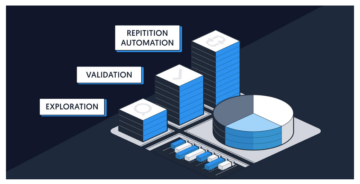Cloud computing has fundamentally transformed how many companies function. Specifically, when businesses leverage the cloud through Internet-based services, it enables new potential for reducing overhead, connecting with global marketplaces, and automating key processes. Below, we will explore the benefits of cloud computing for businesses and how it can improve various operations.
Embracing Cloud Computing: The Transformation Begins
While the shift toward the cloud occurs due to various factors, saving money, expansion, and facile modification capability stand out. Cloud computing enables organizations to access computing resources as required, paying only for actual usage. This spares considerable expense versus traditional on-site systems demanding independent procurement and upkeep of tools and programs. Firms now obtain resources on demand through this model instead of maintaining self-owned infrastructure.


While cloud computing allows business flexibility, carefully considering resource needs remains important. Companies gain the ability to rapidly adjust computer capabilities as required without much effort. For example, during busy periods an organization can swiftly increase computing might to handle higher traffic and afterward lower it when requests lessen. This strategy can help enterprises avoid expensive overprovisioning of technological assets.
Enhancing Performance and Productivity
By utilizing powerful cloud computing resources, businesses can optimize efficiency and perform far better. When companies leverage robust technological solutions, they are capable of managing information and carrying out complex calculations far more rapidly than conventional computers alone allow. This enables the provision of expedited, higher-quality services to individuals. Such improvements contribute to happier, more content clientele who remain loyal supporters.
Businesses have the opportunity to streamline their operations through cloud computing. This allows them to readily utilize numerous computer applications and resources. This can help companies automate various processes, such as tallying revenue from sales and compensating employees. This helps prevent errors while preserving time and money as well.
Enhanced Collaboration
Collaborating using the cloud possesses notable benefits for facilitating teamwork amongst colleagues, partners, and clientele. By providing a secure and flexible means of exchanging data and insights through the cloud, workers can leverage such sharing of information to enhance communication and discussions with fellow team members.
Through cloud computing, businesses have the ability to collaborate with partners and clients around the globe. They can share data and work simultaneously on projects, even if located in different areas. This interconnectivity is enabled by cloud computing. It allows for real-time cooperation across distances. As a result, it may strengthen relationships with partners and customers through seamless teamwork. Satisfied external connections can further a company’s success by facilitating expansion into new domains that previously presented logistical challenges. Overall, cloud technology creates opportunities for improved cross-boundary partnerships and services.
Improved Security
One significant concern for companies regarding cloud computing relates to security. However, utilizing cloud computing can provide enhanced protection compared to traditional on-premise computer utilization. By adopting cloud computing, businesses stand to benefit greatly from the safety measures and recommendations put forth by providers of these services. These experts in cybersecurity protocol are generally quite skilled at addressing risks or vulnerabilities attempting to infiltrate systems.
While cloud service providers utilize top-tier security precautions such as encryption and authentication protocols to verify authorized access, ensuring data protection from unauthorized parties remains a priority. Robust security measures involve monitoring cloud infrastructure and services with dedicated security specialists prepared to swiftly address any security events. Maintaining user privacy and system integrity through diligent oversight and incident response upholds confidence that information remains secure within cloud-based environments.
Addressing Common Concerns About Cloud Computing
Decision-makers may understand the benefits of cloud computing, but they might still have some worries. Here are a few common concerns and how they can be mitigated:
Data Privacy: Businesses often worry that putting data in the cloud could make it vulnerable to possible security breaches. But, well-known cloud service providers put a lot of effort into keeping strong safety measures. These often go beyond what one firm can do by itself. These companies make keeping data safe a top priority. They use strong codes for the information they save and share, as well as strict rules so not everyone can access it.
Downtime: Cloud networks are made to work well, but they can have problems sometimes. The best way to stop this danger is by having a good plan for dealing with disasters and picking a cloud provider who promises they’ll stay up most of the time in their promise (SLA).
Vendor Lock-In: Businesses often worry about getting too much reliance on a single cloud service provider. A well-thought-out plan with many clouds can stop this issue. It lets you use different sellers and keeps progressing if one of them alters how much they charge or the services offered.
Compliance: Businesses moving to the cloud also worry about meeting rules designed for their type of work. But now, most cloud services give out options for different rules and laws. This means it’s easier for companies to follow the right ways without too much stress or worry.
If businesses deal with these issues early and pick a trustworthy cloud service provider, they can fully use all the power that comes from using cloud computing.
Computers in the cloud have changed how businesses work. They help save money, make things bigger and easier to use when needed more or less depending on what’s going on, speed up jobs done faster with no problems use technology well together as a team better too giving higher safety levels at all times safe from anyone trying anything badly related field of making stuff easy through complex process talk under different names. As more businesses start using cloud computing, it’s obvious that this is a tech that’s going to stick around. By embracing cloud computing, businesses can gain a competitive advantage and position themselves for success in today’s fast-paced business environment.
- SEO Powered Content & PR Distribution. Get Amplified Today.
- PlatoData.Network Vertical Generative Ai. Empower Yourself. Access Here.
- PlatoAiStream. Web3 Intelligence. Knowledge Amplified. Access Here.
- PlatoESG. Carbon, CleanTech, Energy, Environment, Solar, Waste Management. Access Here.
- PlatoHealth. Biotech and Clinical Trials Intelligence. Access Here.
- Source: https://www.dataversity.net/cloud-computing-a-paradigm-shift-in-business-operations/
- :has
- :is
- :not
- $UP
- 2024
- a
- ability
- About
- access
- across
- actual
- Ad
- address
- addressing
- adjust
- Adopting
- ADvantage
- All
- allow
- allows
- alone
- also
- amongst
- an
- and
- any
- anyone
- anything
- applications
- April
- April 2024
- ARE
- areas
- around
- AS
- Assets
- At
- attempting
- authorized
- automating
- avoid
- badly
- BE
- below
- benefit
- benefits
- BEST
- Better
- Beyond
- bigger
- breaches
- business
- business operations
- businesses
- busy
- but
- by
- calculations
- CAN
- capabilities
- capability
- capable
- carefully
- carrying
- changed
- charge
- clientele
- clients
- Cloud
- cloud computing
- cloud infrastructure
- cloud services
- Codes
- collaborate
- colleagues
- comes
- Common
- Communication
- Companies
- Company’s
- compared
- competitive
- complex
- computer
- computers
- computing
- Concern
- Concerns
- confidence
- Connecting
- Connections
- considerable
- content
- contribute
- conventional
- cooperation
- could
- creates
- Customers
- DANGER
- data
- data management
- data protection
- DATAVERSITY
- deal
- dealing
- demanding
- Depending
- designed
- different
- disasters
- discussions
- do
- domains
- done
- due
- during
- Early
- easier
- easy
- efficiency
- effort
- embracing
- enabled
- enables
- encryption
- enhance
- enhanced
- ensuring
- enterprises
- Environment
- Errors
- Ether (ETH)
- Event
- everyone
- example
- exchanging
- expansion
- expense
- expensive
- experts
- explore
- facilitating
- factors
- far
- fast-paced
- faster
- fellow
- field
- Firm
- firms
- Flexibility
- flexible
- follow
- For
- forth
- from
- fully
- function
- further
- Gain
- getting
- Give
- Giving
- Global
- globe
- Go
- going
- good
- greatly
- handle
- Have
- having
- help
- helps
- here
- higher
- How
- However
- HTTPS
- IBM
- if
- important
- improve
- improved
- improvements
- in
- incident
- independent
- individuals
- information
- Infrastructure
- insights
- instead
- into
- issue
- issues
- IT
- itself
- Jobs
- keeping
- Key
- Laws
- less
- Lets
- levels
- literacy
- located
- Lot
- lower
- loyal
- made
- maintaining
- make
- Making
- management
- managing
- many
- marketplaces
- May..
- means
- measures
- meeting
- Members
- might
- mitigated
- model
- money
- monitoring
- more
- most
- moving
- much
- names
- needed
- networks
- New
- no
- notable
- now
- numerous
- obtain
- obvious
- of
- offered
- often
- on
- ONE
- only
- Operations
- opportunities
- Opportunity
- Options
- or
- organization
- out
- overall
- overhead
- Oversight
- paradigm
- parties
- partners
- partnerships
- paying
- perform
- performance
- periods
- pick
- picking
- plan
- plato
- Plato Data Intelligence
- PlatoData
- position
- possible
- potential
- power
- powerful
- presented
- prevent
- previously
- priority
- privacy
- problems
- process
- processes
- procurement
- Programs
- progressing
- projects
- promise
- promises
- protection
- protocol
- protocols
- provide
- provider
- providers
- providing
- provision
- put
- Putting
- quite
- rapidly
- real-time
- recommendations
- regarding
- related
- relates
- Relationships
- reliance
- remain
- remains
- required
- resource
- Resources
- result
- right
- risks
- robust
- rules
- safe
- Safety
- sales
- satisfied
- Save
- saving
- secure
- security
- security breaches
- security measures
- Sellers
- service
- Service Provider
- service providers
- Services
- Share
- sharing
- shift
- significant
- simultaneously
- single
- skilled
- So
- Solutions
- some
- sometimes
- specialists
- specifically
- speed
- stand
- start
- stay
- Stick
- Still
- Stop
- Strategy
- Strengthen
- stress
- strict
- strong
- stuff
- success
- such
- supporters
- swiftly
- system
- Systems
- Talk
- tallying
- team
- Team members
- teamwork
- tech
- technological
- Technology
- than
- that
- The
- the information
- their
- Them
- themselves
- These
- they
- things
- this
- Through
- time
- times
- to
- today’s
- together
- too
- tools
- top
- toward
- traditional
- traffic
- Transformation
- transformed
- trustworthy
- trying
- type
- unauthorized
- under
- understand
- use
- User
- user privacy
- using
- utilization
- utilize
- Utilizing
- various
- verify
- Versus
- viewed
- Vulnerable
- Way..
- ways
- we
- WELL
- well-known
- What
- when
- while
- WHO
- will
- with
- within
- without
- Work
- workers
- worry
- you
- zephyrnet











